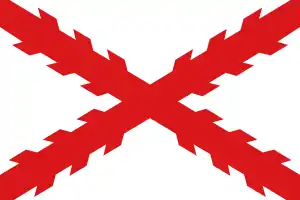Gonzalo Ronquillo de Peñalosa
Gonzalo Ronquillo de Peñalosa (died March 10, 1583),[1] sometimes spelled as Gonçalo Ronquillo Peñaloza, was the fourth Spanish governor and captain-general of the Philippines from April 1580 until his death in 1583. He was succeeded by his nephew, Diego Ronquillo.
Gonzalo Ronquillo de Peñalosa | |
|---|---|
| 4th Governor and Captain-General of the Philippines | |
| In office April 1580 – March 10, 1583 | |
| Monarch | Philip II of Spain |
| Preceded by | Francisco de Sande |
| Succeeded by | Diego Ronquillo |
| Personal details | |
| Born | Arévalo, Spain |
| Died | March 10, 1583 Manila, Captaincy General of the Philippines |
| Mother | Teresa Briceño |
| Father | Rodrigo Ronquillo |
Governorship
His first official action was to order Manila to become Philippines's political and economic capital in 1582. That same year, he established the Palacio del Gobernador (Governor's Palace) in Intramuros, Manila to integrate all governmental activities in the Philippines.[2]
On March 30, 1582, he issued a decree stating that no person may leave the country without his permission. Ronquillo de Peñalosa, according to the content of his order, was informed that some Franciscan priests headed by Fray Pedro de Alfaro left the country in 1579 heading for mainland China. Around March 1582, as he continues, Franciscan Fray Pablo de Jesus and other missionaries re-entered China where they disseminate scandalous talks about the colony.[3]
In June 1582, the first bishop of Manila Domingo de Salazar arrived at the Philippines. That same month, Jesuit missionaries successfully entered the Islands. Ronquillo de Peñalosa also reported that they successfully conquered and annexed the last of Moluccan Islands—the Tidore. He also reported to the King that the other island, Ternate was threatened by conquests and invasions from the British through Sir Francis Drake.[4]
In his dated letter of June 16, 1582, Ronquillo de Peñalosa suggested to the King of Spain of further fortifications of Spanish footholds in the country. He also said that the Spaniards must dominate the Portuguese in Moluccas, and planned for possible seizing of Macau from Portugal. In a reply letter from the King, Philip II instructed the governor on how to initiate the repartimiento (forced labor) among Indios.[5] In 1582, the Spaniards won and defended Cagayan from Sino-Japanese pirates from possible terrorism and invasion.[6]
Post-governorship and death
Former governor-general Francisco de Sande's chief enemy and Manila's attorney-general Captain Gabriel de Rivera filed a complaint against Ronquillo de Peñalosa for being the captain-general of the Philippines for life. In 1583, upon processing of Rivera's complaint, Ronquillo de Peñalosa died at his house in Manila. He was succeeded by his own nephew, Diego Ronquillo in office.[7]
References
- "Spanish Governors of the Philippines, 1565-1616", PhilippineHistory.net, retrieved 11 June 2015.
- "Letter from Ronquillo de Penalosa to Felipe II". Retrieved 2009-10-17.
- "Ordinance Restricting Departure from the Islands". Retrieved 2009-10-17.
- "Letter from Gonzalo Ronquillo de Peñalosa to Felipe II". Retrieved 2009-10-17.
- "Letter from Peñalosa to Felipe II". Archived from the original on 2010-06-12. Retrieved 2009-10-17.
- "Letter from Peñalosa to Felipe II". Archived from the original on 2010-06-12. Retrieved 2009-10-17.
- "Complaints Against Peñalosa". Retrieved 2009-10-17.
| Political offices | ||
|---|---|---|
| Preceded by Francisco de Sande |
Governor and Captain-General of the Philippines 1580–1583 |
Succeeded by Diego Ronquillo |

.svg.png.webp)